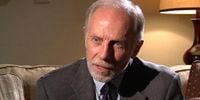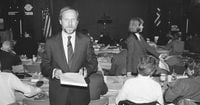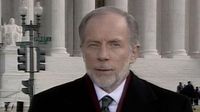Charles Bierbauer, a towering figure in American broadcast journalism and academia, died at age 83 on Friday at his home in Spruce Pine, North Carolina, his family announced. The news, confirmed by both the University of South Carolina and CNN, marks the end of an era for a man whose career spanned war zones, White House corridors, and the halls of higher education.
Bierbauer’s journey began humbly in his native Pennsylvania. He started as a weekend reporter for WKAP and later worked for The Associated Press in Pittsburgh. His early years were marked by a tenacious curiosity and a willingness to go where the story led—even if that meant trouble. According to the Associated Press, he was once detained in Moscow’s Red Square while filming an anti-Soviet demonstration. In 1978, while covering Muhammad Ali’s travels in the Soviet Union, the Soviet press denounced him for “asking impertinent questions.”
His reporting prowess was soon recognized on the international stage. In 1973, he won an Overseas Press Club Award for his coverage of the Yom Kippur War. Bierbauer’s international credentials only grew as he took on posts in London, Bonn, and Vienna for Westinghouse Broadcasting. By 1978, he was ABC News’ Moscow bureau chief, later moving to serve as the network’s chief in Bonn, Germany, as reported by CNN.
But it was at CNN, the then-fledgling cable network, where Bierbauer truly left his mark. Joining in 1981—just a year after CNN’s launch—he quickly became one of its most recognizable correspondents. Over the next two decades, Bierbauer covered the Pentagon, the White House, the U.S. Supreme Court, and nearly every major political story of the era. He was CNN’s senior White House correspondent for nine years, reporting on the administrations of Presidents Ronald Reagan and George H.W. Bush, and later became the network’s senior Washington correspondent. He traveled with presidents to all 50 states and more than 30 countries, according to CNN.
Bierbauer’s expertise in U.S.-Soviet relations was unmatched. He covered every U.S.-Soviet summit from 1975—when President Gerald Ford met Leonid Brezhnev—through the historic 1992 meeting between Presidents George H.W. Bush and Boris Yeltsin. His reporting offered viewers a front-row seat to some of the most consequential moments of the Cold War and its aftermath.
He also covered presidential campaigns from 1984 to 2000, providing viewers with insight into the shifting sands of American politics. His versatility extended to the anchor’s chair, where he hosted CNN’s weekly show “Newsmaker Saturday” for a decade, interviewing top newsmakers and shaping the national conversation.
Bierbauer’s work did not go unrecognized. He won an Emmy for his coverage of the 1996 Olympic Park bombing in Atlanta, a testament to his ability to report calmly and clearly under pressure. He also served as president of the White House Correspondents’ Association from 1991 to 1992, reflecting the respect he commanded among his peers.
“Charles Bierbauer was a cherished member of the CNN family, who covered everything from the White House and the Pentagon to the Supreme Court during his two decades with the network,” a CNN spokesperson said Sunday. “A tireless reporter and wonderful colleague, Charles will be remembered for his outstanding journalism and his willingness to help others.”
Longtime CNN anchor Wolf Blitzer, in a statement to the Associated Press, described Bierbauer as both a mentor and a friend. “Charles inspired me and helped me throughout my assignments at the Pentagon and the White House. He was a good friend, colleague, and mentor, and I will certainly miss him,” Blitzer said.
After retiring from CNN in 2001, Bierbauer embarked on a new chapter in academia. In 2002, he became the first dean of the University of South Carolina’s College of Information and Communications—a merger of the university’s mass communications and library science programs. According to university spokesman Jeff Stensland, Bierbauer led a multimillion-dollar fundraising and renovation effort that moved the school from its outdated digs in the Carolina Coliseum to a state-of-the-art building on the university’s historic Horseshoe.
He was not content to simply oversee the school’s transformation from behind a desk. Bierbauer launched Cocky’s Reading Express, a childhood literacy initiative aimed at promoting reading among young children in South Carolina. He also continued to host a weekly current events program and moderated political debates through a partnership with South Carolina Educational Television, ensuring that the next generation of journalists would benefit from his experience and insight.
Jay Bender, a former attorney for the South Carolina Press Association and retired professor, recalled Bierbauer’s impact as dean. “His contributions to the USC Journalism School as dean were significant,” Bender said, specifically citing the project that modernized the school and moved it to its current location. Tom Reichert, who succeeded Bierbauer as dean, echoed this sentiment, noting Bierbauer’s “profound impact on the program” and his support for students who went on to win Pulitzer Prizes.
Bierbauer’s academic credentials were as impressive as his professional ones. He graduated in 1966 from Pennsylvania State University with a bachelor’s degree in Russian and both bachelor’s and master’s degrees in journalism. The university recognized him as a distinguished alumnus and alumni fellow, a fitting honor for a man whose career had such broad impact.
He was married to Susanne Schafer, a longtime military affairs reporter for the Associated Press. Bierbauer is survived by Schafer, four children, several grandchildren, and a great-grandchild, according to his family’s obituary. The family described his passing with a touch of warmth and humility: “his generous heart gave out after a good, long life.”
The journalism world, and those who knew him personally, are left with a legacy of dogged reporting, principled leadership, and a commitment to education. Bierbauer’s story is a reminder of the profound influence one individual can have—across continents, newsrooms, and generations.



